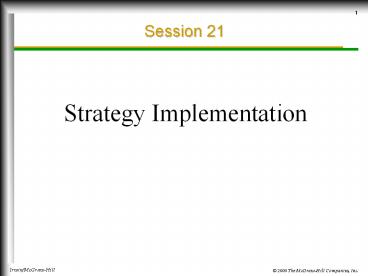Strategy Implementation - PowerPoint PPT Presentation
Title:
Strategy Implementation
Description:
Strategy Implementation ... Corporate Strategy Business Strategies Functional Tactics Corporate strategy Achieve 15-20 % annual growth through existing businesses ... – PowerPoint PPT presentation
Number of Views:312
Avg rating:3.0/5.0
Title: Strategy Implementation
1
Session 21
- Strategy Implementation
2
Strategic Management Model
3
Strategy Implementation
Identify short-term objectives
Initiate specific functional tactics
Communicate policies to empower people
Design effective reward systems
4
What are Short-Term Objectives?
Provide specific guidance for what is to be done,
translating vision into action
5
Role of Short-Term Objectives in Implementing
Strategy
1. Operationalize long-term objectives
2. Raise issues and potential conflicts requiring
coordination to avoid dysfunctional consequences
3. Identify measurable outcomes of functional
activities to be used to make feedback,
correction, and evaluation more relevant
6
Potential Conflicting Objectives and Priorities
7
Relationship of Action Plans to Short-Term
Objectives
Specificity - Identify functional activities to
be undertaken to build competitive advantage
Provide a clear time frame for completion
Identify who is responsible for each action in
the plan
8
Qualities of Effective Short-term Objectives
9
Creating Measurable Objectives
10
Value-Added Benefits of Short-Term Objectives
Give operating personnel a better understanding
of their role in a firms mission
Provide basis for accomplishing conflicting
concerns
Provide basis for strategic control
Motivation - Clarify personal and group roles in
a firms strategies
11
Functional Tactics (aka Short Term Strategies)
- key, routine activities that must be undertaken
in each functional area to provide the businesss
products and services - In a sense, functional tactics translate thought
into action - Every value chain activity in a company executes
- functional tactics that support the businesss
strategy and help accomplish strategic objectives
12
Functional Tactics at General Cinema Corporation
13
Functional Tactics
- Functional tactics are different from business or
corporate strategies in three fundamental ways - Time horizon
- Specificity
- Participants who develop
- them
14
Characteristics of Functional Tactics in
Production/Operations
- Viewed as core function of an organization
- Involves converting inputs into value-enhanced
output - Focuses on decisions regarding
- Basic nature of firms POM system,
- Seeks optimum balance between investment input
and production/operations output - Location
- Facilities design
- Process planning on a short-term basis
15
Key Functional Tactics in POM
16
Characteristics of Functional Tactics in Marketing
- Lead to strategic success of the firm through the
profitable sale of products/services in target
markets - Clearly identify customer needs that
products/services aim to meet - Identify where, when, and by whom
products/services are to be sold - Define how firm will communicate with target
markets - Directly influence supply, demand, profitability,
consumer perception, and regulatory response
through pricing
17
Key Functional Tactics in Marketing
18
Characteristics of Functional Tactics in
Accounting and Finance
- Time frame of finance tactics varies because they
direct use of financial resources supporting the
business strategy, long-term goals, and annual
objectives - Long-term tactics guide decisions in
- Long-term capital investment
- Debt financing
- Dividend allocation
- Leveraging
- Short-term tactics guide decisions in
- Managing working capital and short-term assets
- Accounting-focused tactics have taken on
increased strategic significance in last decade
19
Key Functional Tactics in Finance and Accounting
20
Characteristics of Functional Tactics in RD
- Assumed a key strategic role in many firms due to
increasing rate of technological change - May be more critical instruments of business
strategy in some industries than in others
21
Key Functional Tactics in RD
22
Characteristics of Functional Tactics in HRM
- Assumed increasing strategic importance in the
1990s - Aid long-term success in
- Development of managerial talent and competent
employees - Creating systems to manage compensation or
regulatory concerns - Guiding effective utilization of human resources
to achieve both the - Firms short-term objectives
- Employees satisfaction and development
23
Key Functional Tactics in HRM
24
Empowering Operating Personnel Policies
- Empowerment is the act of allowing an individual
or team the right and flexibility to make
decisions and initiate action - Policies are directives designed to guide the
thinking, decisions, and actions of managers and
their subordinates in implementing a firms
strategy
25
Creating Policies That Empower
- Policies establish indirect control over
independent action - Policies promote uniform handling of similar
activities - Policies ensure quicker decisions by
standardizing answers to recurring questions - Policies institutionalize basic aspects of
organization behavior - Policies reduce uncertainty in repetitive and
day-to-day decision making - Policies counteract resistance
- Policies afford managers a mechanism for avoiding
hasty decisions
26
Advantages of Formal, Written Policies
- They require managers to think through the
policys meaning, content, and intended use - They reduce misunderstanding
- They make equitable and consistent treatment of
problems more likely - They ensure unalterable transmission of policies
- They communicate the authorization or sanction of
policies more clearly - They supply a convenient and authoritative
reference - They systematically enhance indirect control and
organization wide coordination of the key
purposes of policies
27
Executive Compensation Plans
- Stock options provide the executive with the
right to purchase company stock at a fixed price
in the future - Restricted stock is designed to provide benefits
of direct executive stock ownership - Golden handcuffs occur where the stock
compensation is deferred until vesting time
provisions are met or a bonus is deferred - Golden parachutes are a form of bonus
compensation that is designed to retain talented
executives - Cash bonuses based on accounting measures































